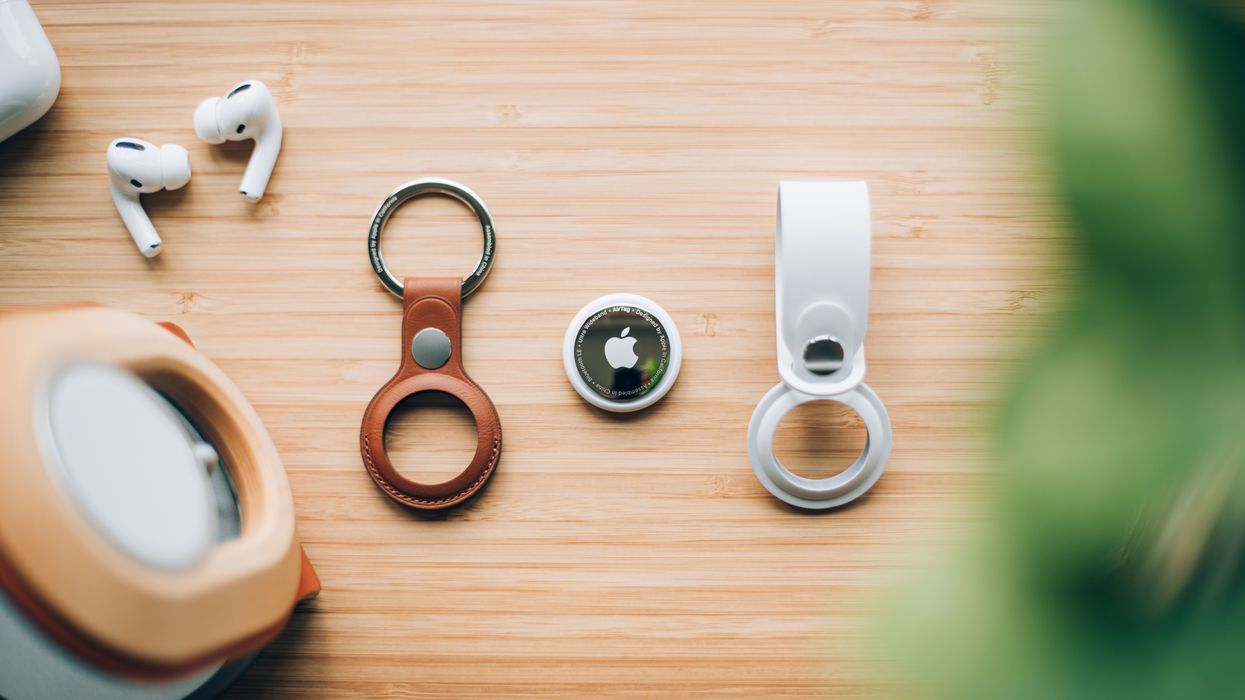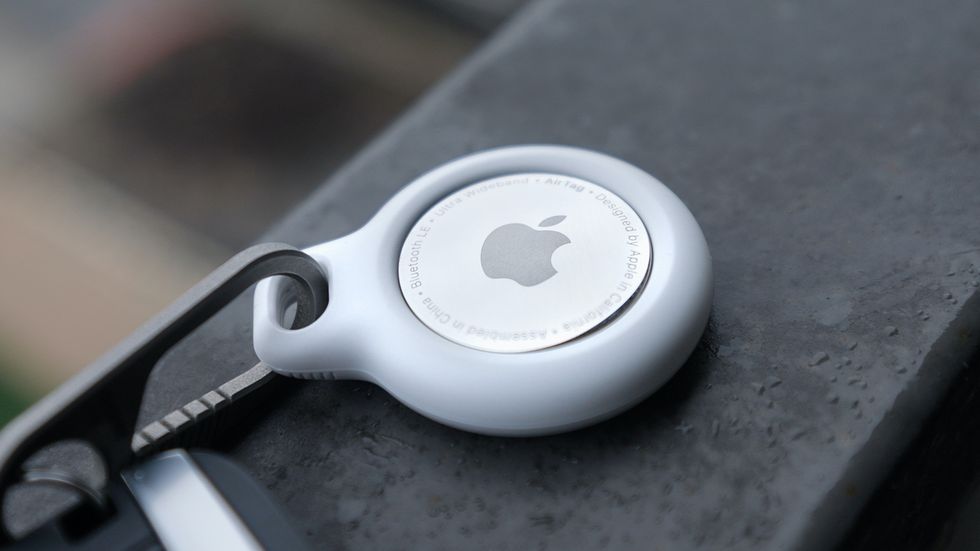Here's What You Need To Know About Flying With An AirTag From Canada
The device is this summer's ultimate travel companion.

An Apple AirTag and keyrings.
Narcity may receive a small commission if you buy something from this article, which was created independently by Narcity's Editorial team just for you.
Planning some summer travel? If you're flying this year and want to keep track of your luggage, you may have considered using an AirTag.
AirTags have become one of this summer's most popular travel accessories, and for good reason — they give you peace of mind since you don't have to worry about locating your luggage, should it go missing.
But where can you use an AirTag? And is it totally within the rules? Here's what you need to know if you're thinking of travelling with one this summer.
What is an AirTag?
Apple's AirTag is an item tracker that came out in 2021. You can attach the tracker to your keys, put one in your purse, or use it with other items that you're likely to misplace.
According to Apple, the AirTag sends out a Bluetooth signal that can be detected by nearby devices in the Find My network. You can then go to the Find My app on your iPhone and see your AirTag on a map.
If you can't find what you're looking for, you can play a sound on the speaker's AirTag that will help you locate missing items.
The AirTag also uses Precision Finding to help you find your stuff, a feature that reviewers say sets it apart from other trackers.
Can I fly with an AirTag in my luggage?

An Apple AirTag.
AirTags use a lithium 3V coin battery, and if you're using them for the purposes of tracking your luggage, they have to be left on while you're travelling.
The Federal Aviation Administration says that devices containing lithium metal batteries or lithium ion batteries, such as phones, cameras and laptops, should be kept in carry-on luggage.
"If these devices are packed in checked baggage, they should be turned completely off, protected from accidental activation and packed so they are protected from damage," it says.
In Canada, the Canadian Air Transport Security Authority advises keeping all batteries (and electronics that contain batteries) on you or packed in your carry-on.
It also warns that "not all airlines allow lithium batteries carried in personal devices such as laptops or cell phones in checked baggage," and recommends checking with the airline you'll be travelling with.
However, the advice seems to be that, in general, travelling with an AirTag is OK.
In a statement to Narcity, Transport Canada said that AirTags that comply with the Transportation of Dangerous Goods Regulations and the International Civil Aviation Organization Technical Instructions for the Safe Transport of Dangerous Goods by Air can be used legally both in Canada and internationally.
Under the regulations, baggage equipped with a lithium metal battery not exceeding 0.3 grams can be put in checked baggage or in the plane cabin. Other lithium batteries that comply with these requirements are safe for travel, TC said.
"AirTags use a CR2032 lithium metal button cell, which typically has around 0.109 grams of lithium."
It also said that the rules that apply in Canada also apply to international flights. And while it's a good idea to check with the airline you're travelling with about rules or restrictions, there's no requirement for passengers to notify their airline of their AirTag under the TDG Regulations, Transport Canada said.
The FAA has also OK'd AirTags. In 2022, the FAA issued a statement about the use of the devices after German carrier Lufthansa said it would be banning AirTags from checked baggage because they are "classified as dangerous and need to be turned off."
"Luggage tracking devices powered by lithium metal cells that have 0.3 grams or less of lithium can be used on checked baggage," the FAA said in a statement published by the Points Guy and several other outlets. "Apple AirTags meet this threshold; other luggage tracking devices may not."
A WestJet representative said that while AirTags may not be the best for providing an indication of who the bag belongs to in the event that it becomes lost (you should still include your name and contact details on your luggage) it may be helpful in locating lost luggage.
"If a guest has an AirTag and is able to track their baggage to a specific location and provides that information to our Baggage team, this will assist us in locating their bag," they said.
Are AirTags worth the money?
Using an AirTag to keep track of important items can definitely offer some peace of mind, especially while in a foreign country.
Earlier this year, multiple stories emerged of passengers using AirTags to track down their lost luggage, including that of a couple from Ontario who used an AirTrag to locate their luggage after it went missing from an Air Canada flight and was seemingly donated to charity.
If keeping an eye on your things sounds good to you, you can purchase a single AirTag on Amazon for $39, or a four-pack for $129 — which may be especially handy if you plan on using them to track multiple things.
- An Ontario TikToker Says Air Canada 'Wrongfully' Donated Her Lost Luggage To Charity (VIDEO) ›
- A United Passenger's Luggage Showed Up After 4 Years & It Somehow Visited Another Country ›
- An Airline Passenger Put A Tracker On Her Own 'Lost' Luggage & It Turned Into A Wild Chase ›
- Air Canada Has Some Strict Baggage Rules & Here's Everything You Need To Know When Packing - Narcity ›
- Calgary Airport is hiring for jobs right now and you can make up to $149K - Narcity ›